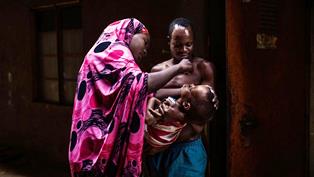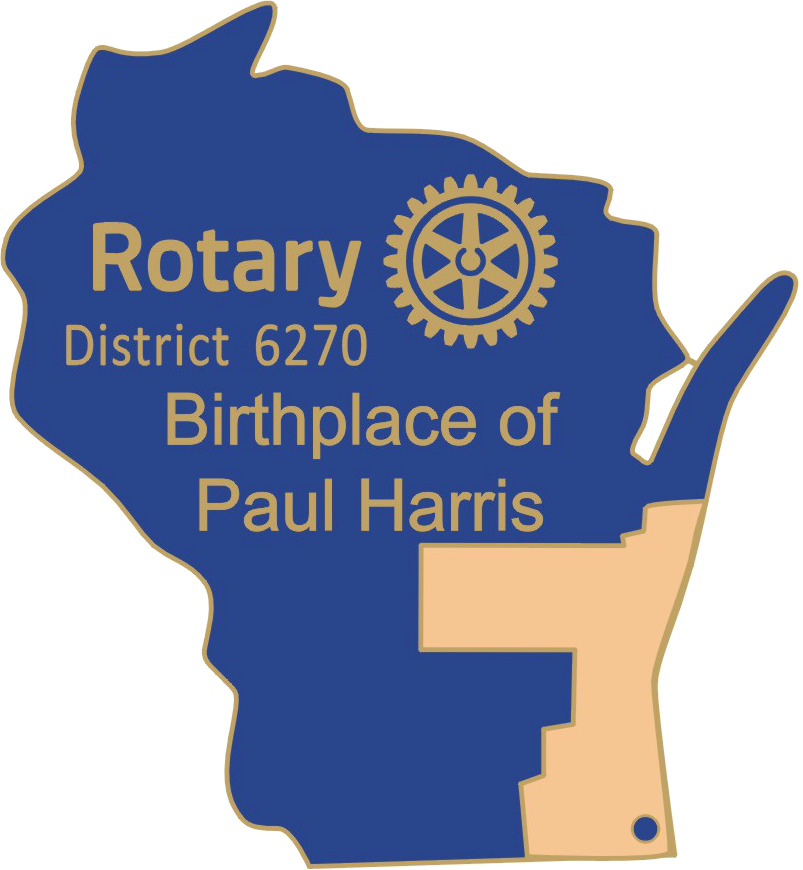Polio Vaccinators Make Significant Headway in Nigeria

A vaccinator immunizes a child against polio in Maiduguri, Nigeria.
Photo Credit: Diego Ibarra Sánchez
Nigeria is closer than ever to eradicating polio, riding a successful effort to reach children in seven northern states at highest risk for the disease.
"Rotarians have [gone] into remote areas of the country by car, canoe, motorbike, and even on foot to ensure every child gets the vaccine," says Rotary's Nigeria PolioPlus Committee Chair Tunji Funsho.
In Katsina state, members of the Nigeria PolioPlus Committee (NPPC) recently met with leaders of two communities notoriously opposed to immunization, mainly on religious grounds and in protest of the lack of basic health care. They persuaded the leaders to endorse vaccination by obtaining government assurance that mobile health camps would provide free checkups, medications, immunization against diseases besides polio, and other services.
"It was very encouraging to see the positive impact of engaging these leaders . . . witnessed by the huge turnout of crowds at the health camps and women willingly presenting their children for vaccination in households, quranic schools, and other locations," reports the NPPC. "[The camps] are one of the proven 'quick wins' to untie the knots of persistent noncompliance in some settlements across the high-risk states."
Along with Pakistan and Afghanistan, Nigeria has never stopped transmission of the wild poliovirus. However, it has recorded only three polio cases so far this year (as of 3 June), down from 24 cases for the same period in 2013.
The NPPC began providing funding for the health camps in May. And in response to community demands for clean water, some Rotary clubs are sponsoring projects to install boreholes.
In high-risk states like Katsina, "the mere participation of community leaders, allowing their own children to be vaccinated or pronouncing the acceptance of OPV [oral polio vaccine] is enough to encourage community members to allow the vaccination teams into their homes," says Funsho.
Rotary field coordinators are helping close immunization gaps in northern Nigeria by gaining public support from government and community leaders through providing technical support, and monitoring the quality of vaccination teams.
"In the security challenged areas, measures such as 'fire walling,' which ensures that children going in and out of Borno and Yobe states are immunized, have been put in place," says Funsho. Teams of health workers and security agency personnel also use "hit and run" tactics to immunize children and withdraw in two days' time or less, he adds.
The NPPC promotes public awareness of the need to eradicate polio through community billboards and posters, along with distributing T-shirts, caps, and aprons to health workers. And it has engaged national celebrities like musician and actor Sani Musa Danja to encourage vaccine acceptance in communities where pockets of opposition still exist.
In April, Rotary joined the Federal Ministry of Health in sponsoring the Nigeria Polio Summit. Governors of high-risk states, religious and traditional leaders, national and global health officials, Rotary members, and others focused on best practices in the country's drive to become polio free.
Funsho and others are optimistic that Nigeria can stop polio transmission by the end of 2014, one of the goals of thepolio endgame strategic plan. Rotary is a leading partner in the Global Polio Eradication Initiative.
"The greatest challenge . . . will be the preparations for the 2015 elections," said Dr. Oyewale Tomori, chair of Nigeria's Expert Review Committee on Polio Eradication, in a recent GPEI interview. "Every election year since 2003 has been characterized by abandonment of good governance, and subsequently accompanied by a surge in polio cases."
To help Nigeria seize the opportunity to end polio this year, Rotary released $7 million to the GPEI to fund immunization activities and research in the country. And business leader and philanthropist Sir Emeka Offor has contributed $2.25 million to PolioPlus.
"The Nigerian government, now supported by the international community, is doing all that it can to eliminate the widespread violence, abductions, and terrorism," says Sir Emeka, a member of the Rotary Club of Awka GRA and Rotary's polio ambassador in Nigeria. "Peace would facilitate polio eradication, but we cannot sit by and wait until that time comes. We must do what we can to find ways to end polio now."
Learn about the polio endgame strategic plan
By Dan Nixon
Rotary News
25-JUL-2014

